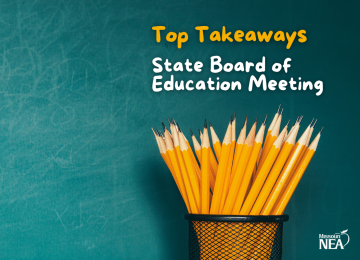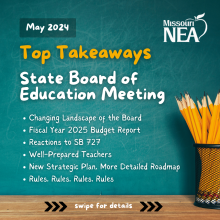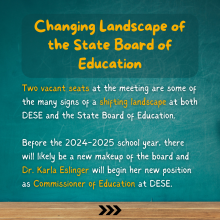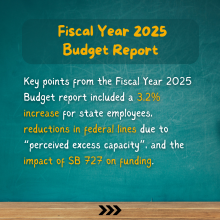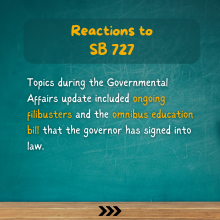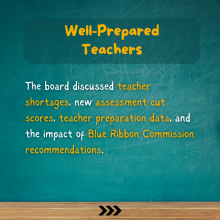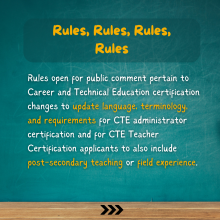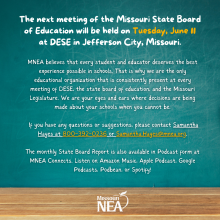By Samantha Hayes, MNEA Professional Practice Director
Changing Landscape of the State Board of Education
The seats of Donald Claycomb (Linn, Missouri) and Peter Herschend (Branson, Missouri) were vacant on Tuesday as both board members have ended their terms on the Missouri State Board of Education. Claycomb and Herschend’s seats have not been filled yet due to various factors. The governor withdrew his appointments when the Senate Committee on Gubernatorial Appointments was unable to conduct a hearing to consider these appointments due to a lack of time on the Senate calendar.These two vacant seats at the meeting are some of the many signs of a shifting landscape at both DESE and the State Board of Education. Before the 2024-2025 school year, there will likely be a new makeup of the board and Dr. Karla Eslinger will begin her new position as Commissioner of Education at DESE.
- Fiscal Year 2025 Budget Report
Key points from the Fiscal Year 2025 Budget report included a 3.2% increase for state employees, reductions in federal lines due to “perceived excess capacity,” and the impact of SB 727 on funding. There were significant discussions about reallocating funds based on usage and upcoming changes in childcare funding and the “mother of all supplemental budgets” in the latter half of the year (see also, The Independent article on DESE’s Budget report).
“The Missouri NEA believes that the State Board of Education and the Commissioner of Education have an obligation to propose an education budget that will meet the educational needs of Missouri’s students. The State Board and the Commissioner must request sufficient appropriations so as not to jeopardize the future of public education in Missouri” (A-14). - Reactions to SB 727
Topics during the Governmental Affairs update included ongoing filibusters, the omnibus education bill (HB 2278 and SB 727—known as SB 727) that the governor has signed into law. SB 727 expands the existing tax credit voucher (initially enacted in 2021) and authorizes the establishment of charter schools in Boone County without sponsorship by the local school board. The discussion highlighted challenges in budgeting for new legislative requirements, specifically those in SB 727, and potential supplemental funding needs.
“The Association also believes that federally or state-mandated parental option plans compromise free, equitable, universal and quality public education for every student. Such plans include tax credits for tuition to private and parochial schools, voucher plans, or funding formulas that have the same effect” (A-5).
Further, “charter schools serve students and the public interest when they are authorized and held accountable by the locally elected school board. Charter schools should be authorized or expanded only after a district has assessed the impact of the proposed charter school on local public school resources, programs and services,” which has not been the case with the expansion of charter schools in Boone County (A-6). - Well-Prepared Teachers
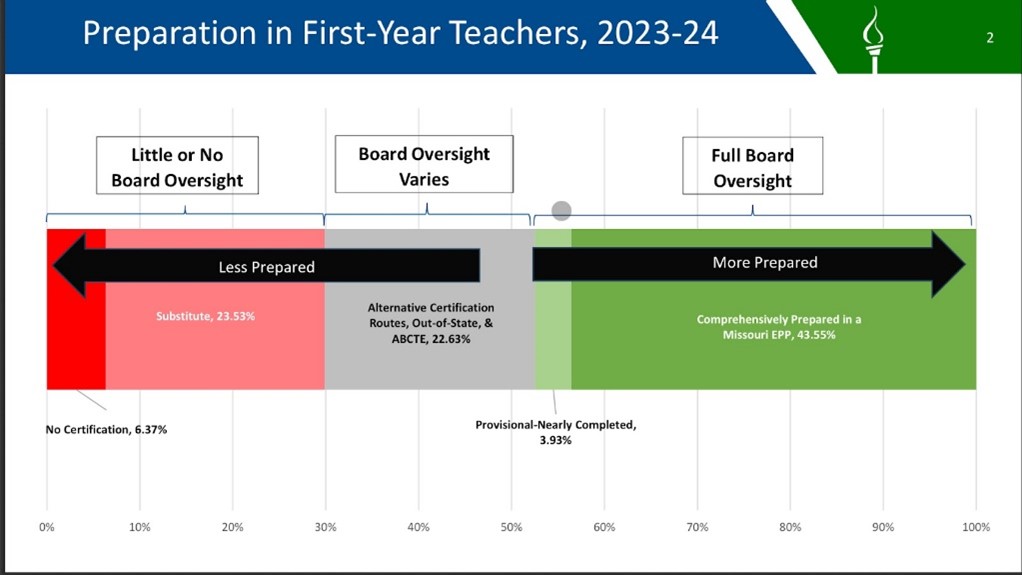
The board discussed teacher shortages, new assessment cut scores, teacher preparation data, and the impact of BRC (Blue Ribbon Committee) recommendations—including the minimum teacher salary, apprenticeship and residency program support, master teacher certificate, and expanding MLDS. Future considerations included GPA and coursework requirements, as well as the development of a master teacher certification.
The typical pie chart representing the data regarding where first-year teachers in Missouri have gotten their certification has also been remade to show both how prepared first-year teachers are and how much board oversight the state board has over the quality of educator preparation.
“The Missouri NEA believes that every child should have a qualified teacher in the classroom at all times." Furthermore, “The Association also believes that the traditional route for certification provides a more rigorous foundation and field experience for teacher preparation and should be preferred” (D-12 and G-8).
- New Strategic Plan, More Detailed Roadmap
The strategic plan process, spanning 14 months, emphasized stakeholder inclusion and introduced new strategic pillars and foundational elements. Upcoming steps involve refining roadmaps and statewide stakeholder engagement initiatives. This new strategic plan for the state board and the department will serve as the roadmap for decisions in the future with an annual review cycle and evaluation of the plan every three years.
- Rules, Rules, Rules, Rules
There were many rules approved for Order of Rulemaking and Notice of Rulemaking. Rules that were approved for a notice of rulemaking now are open for public comment. These rules open for public comment pertain to Career and Technical Education certification changes to update language, terminology, and requirements for CTE administrator certification and for CTE Teacher Certification applicants to also include post-secondary teaching or field experience.
The next meeting of the Missouri State Board of Education will be held on June 11, 2024 at DESE in Jefferson City, Missouri. If you have any questions or suggestions, please contact Samantha Hayes at 800-392-0236 or Samantha.Hayes@mnea.org.
The monthly State Board Report is also available in Podcast form at MNEA Connects. Listen on Amazon Music, Apple Podcast, Google Podcast, Podbean, or Spotify.


